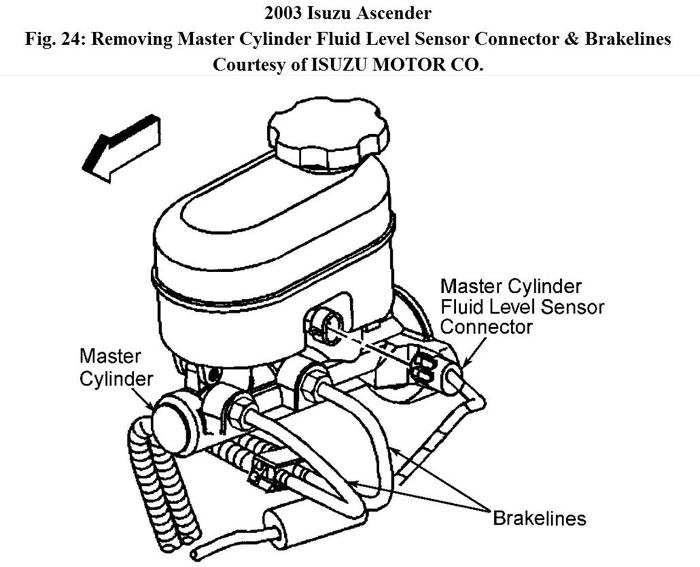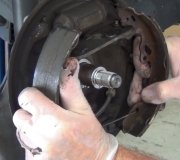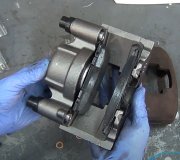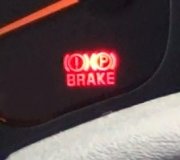I'm a little confused. Is this the second new master cylinder? And that stopped the dragging problem? Hmm. Do you think there's a chance the original problem started with contaminated brake fluid?
First of all, that push rod did not change on its own. A person only has to worry about that if they messed with it or in rare cases when it's different for a new master cylinder. Second, many push rods are not adjustable and don't need to be. When they are, you don't have to fight to get to the end of it. Since it appears yours is somewhat hidden, I doubt you're going to see a threaded piece on the end.
We've already eliminated the most common parts that can cause dragging because you changed them already. Those are the calipers, then the flex hoses, then the master cylinder. Now we're looking for something less common. The logical, although often incorrect assumption is the brake fluid is being trapped by the seals in the master cylinder so we look there first. Holding the brake pedal down an inch with your foot will do that, obviously, because that's what it's supposed to do, but those seals have to return back far enough to let the brake fluid wash back up into the reservoir. There's only a few things that will cause that fluid to be trapped so it can't return. One is holding the brake pedal down. A second possibility is a brake light switch or a pedal return stop that is adjustable AND is out of adjustment. I think we ruled that out. With either of those, loosening the master cylinder on its mounting nuts will let it push forward a little so the pistons and seals can release fully. If that lets the brakes release, that's when we have to look closer in that area.
The third cause, and it is disastrous, is the brake fluid contaminated with petroleum product. Common causes are laying the reservoir cap on an oil film on the engine, repacking front wheel bearings with grease, then using your fingers to pop the rubber bladder seal back into the reservoir cap, and having grease on your hands while attaching any of the hydraulic brake components that come in contact with brake fluid. Many people use penetrating oil to get flex hose fittings loose. That will introduce contamination into the fluid. Many conscientious mechanics will even wash their "clean" hands before handling brake parts to get the fingerprint grease off of them.
When the brake fluid is contaminated, all rubber parts that contact it will grow and get soft and mushy. The first sign is the lip seals in the master cylinder will grow forward and block the fluid return ports. In that case the pistons are already fully released to their normal at-rest position and loosening the master cylinder won't help, but loosening the steel lines WILL let that trapped fluid release. The way that would typically play out is the contamination would affect the master cylinder first if that's where it was introduced. Replacing the master cylinder would solve that for about a week if the contamination was minor, or in as little as a day or two if someone poured power steering fluid, engine oil, or transmission fluid into the reservoir. Even if the brake fluid is replaced through bleeding the system, that contamination will continue to leach out of the affected rubber parts and will recontaminate the new fluid and any new rubber parts. You would develop the same problem with a new master cylinder within a few days to a week. The only acceptable repair for fluid contamination is to replace every part that has rubber parts that contacts the fluid, and before the new parts are installed, the lines must be flushed and dried. That includes the master cylinder, calipers, wheel cylinders, 4-wheel-ABS hydraulic controller or rear-wheel-ABS control valve, all three or four flex hoses, and the combination valve assembly. All of those parts have rubber seals, o-rings, or hoses. I've been involved with three older cars that had their master cylinders filled with transmission or power steering fluid, and those were real big jobs.
At any rate, before we go down that road, we need to verify trapped brake fluid is causing the dragging brakes, and if so, how far up the system can be opened to release the pressure. If the brakes do not release by opening the bleeder screws on the calipers, a mechanical problem would be suspect. Calipers can stick but since you already replaced them, that is not the cause. We would look for a lack of high-temperature brake grease on the sliding mounts, and especially rusted or pitted caliper mounting pins. The chrome plating must be in good shape and the pins must not be bent or cross-threaded. Things like that will prevent the caliper from sliding sideways freely.
Monday, July 2nd, 2012 AT 6:59 AM




